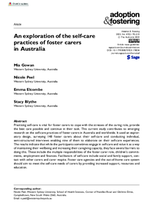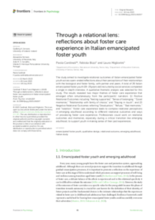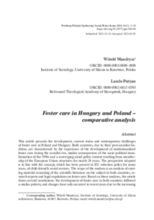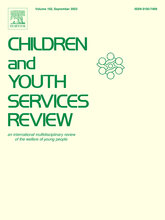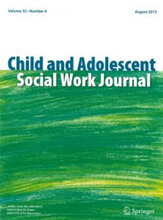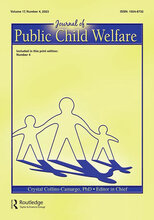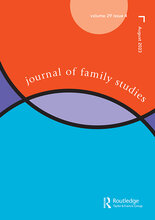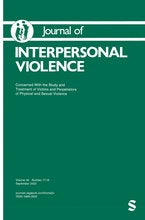Displaying 81 - 90 of 2221
This study contributes to emerging research on the self-care practices of foster carers in Australia and worldwide.
This study aimed to investigate relational outcomes of Italian emancipated foster youth across open-ended reflections about their perceptions of their relationships with the biological and foster family, with partner and peers.
This article presents the development, current status and contemporary challenges of foster care in Poland and Hungary.
This study examines early adulthood outcomes—incarceration and teen parenthood—among youth in Wisconsin who entered foster care in early-to-middle childhood (ages 5–10).
This U.S.-based mixed-methods study explored foster parent satisfaction with intent to turnover and disrupt placement in 362 foster parents through regression analyses. It included foster parents in six mid-Southwestern states who participated in an online survey between June 2021 and January 2022.
This mixed-methods study included foster parents in six mid-Southwestern states in the U.S. foster parents serve a critical role in the child welfare system; however, many report being dissatisfied with their role. As such, dissatisfied foster parents are at risk of disruption and turnover, ultimately resulting in placement moves for youth in care. Placement moves have negative impacts on youth well-being, prompting a need to explore issues related to placement longevity related to foster parent satisfaction.
The objective of this webinar was to present the best practices learnt in the implementation of the foster care system as an alternative to limited child care institutions for children on the move in The Gambia.
Research on foster youth often focuses on risk, rather than adaptation, strengths, and assets. In this US-based study, these researchers shift the narrative by examining resiliency with foster youth.
This study aims to develop an understanding of the distinctive features of kinship and non-kin foster care based on information obtained from fostered children and child care professionals in Spain.
This US-based study explores factors associated with intimate partner violence using longitudinal data from a representative sample of older youth in California Foster Care who participated in the California Youth Transitions to Adulthood Study (CalYOUTH). The authors' IPV outcome measures included victimization, perpetration, bidirectional IPV, and emotional abuse.

